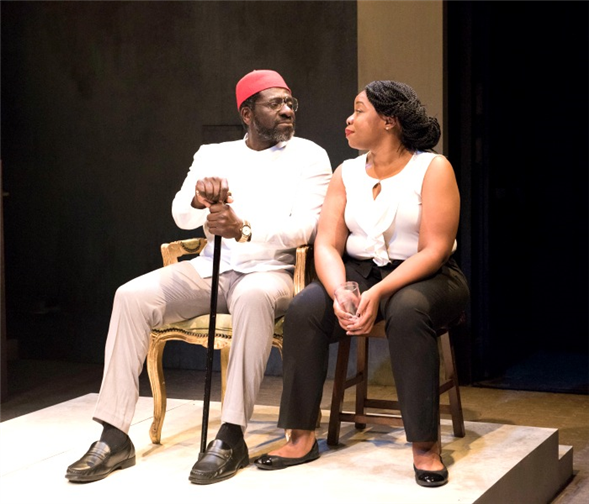Translate Page

Playwright Ngozi Anyanwu makes her Off-Broadway debut at Atlantic Theater Company
---
Ngozi Anyanwu was born in Trenton, New Jersey, and had what she describes as a typical American childhood in the suburbs of Bucks County, Pennsylvania. Her parents, in contrast, grew up in small villages in southeastern Nigeria. Every time Anyanwu, now 35, traveled there to see relatives, she experienced the mixture of familiarity and foreignness that many first- and second-generation immigrants feel when visiting their ancestral homeland.
Those conflicting sentiments fuel Anyanwu's world-premiere play The Homecoming Queen about a successful novelist who returns to Nigeria to tend to her ailing father. Currently running at Atlantic Theater Company, it's one of many recent works by playwrights from the African diaspora that offer a fresh look at the immigrant experience.
Like Mfoniso Udofia's The Ufot Cycle and Danai Gurira's Familiar, The Homecoming Queen challenges the misconception that all African people are war-ravaged, famine-stricken, or otherwise impoverished. Anyanwu and Udofia -- who actually plays the lead in The Homecoming Queen -- feel so strongly about upending those stereotypes that they helped cofound the NOW AFRICA: Playwrights Festival in order to showcase the diversity of voices from the continent.
{Image1}
Although Anyanwu (like Udofia) trained as an actor, writing allows her to contribute to a richer understanding of the breadth of African and African-American culture. "There's a deep attraction to black trauma," she laments. "It's a very strange delineation that because it's Africa, it's only going to be about one of those three things. And it's not to say that I don't have those things in my plays, but I'm really trying to ground them in what I think is universal and familiar to everybody. Essentially, at the heart of it, The Homecoming Queen is a family play."
As the show opens, Kelechi (Udofia) is greeted enthusiastically by the local village women. But after 15 years away, Kelechi has become so westernized that she's forgotten many tribal traditions and even most of the local Igbo language. What she still vividly recalls, however, are the incident that drove her to leave and the playmate she left behind. Now a successful banker, her old friend (played by Segun Akande) and her professor father (portrayed by Oberon K.A. Adjepong) try to convince her to stay in Nigeria.
The structure of the one-act play echoes the duality of Kelechi's feelings about her return. Some parts are naturalistic, but there are also surreal and even ritualistic elements as Kelechi wrestles with her past and what she wants for her future. "I think it creates more empathy when you actually can kind of go back and forth through time and see what it is a character has been through and what it is that gets them to their place in the present," says Anyanwu. "And I think it's fun to throw away the rules."
The four performers playing the village women serve as both a Greek chorus commenting on events, and as ancestral spirits attempting to guide Kelechi on her journey. "Whenever I go to Nigeria I am greeted by women on our front porch," says Anyanwu. "So they're gossipy women, but they're also Kelechi's ghosts, her demons, her lineage."
The word homecoming in the title can be interpreted in many ways. It refers to Kelechi's return to the village, of course, but also her father's imminent death and how she must reconcile the disparate parts of her identity. But Anyanwu sees it simply: "Basically, it's about what it is that makes some place or someone your home." Now that's something all audiences, regardless of origin, can relate to.
Janice C. Simpson writes the blog Broadway & Me.
Top image: Oberon K.A. Adjepong and Mfoniso Udofia in The Homecoming Queen. Photos by Ahron R. Foster.
TDF MEMBERS: Go here to browse our latest discounts for dance, theatre, and concerts.